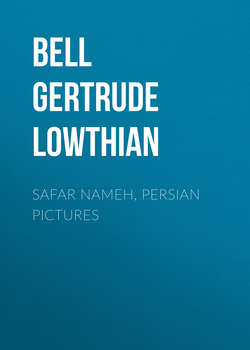Safar Nameh, Persian Pictures

Реклама. ООО «ЛитРес», ИНН: 7719571260.
Оглавление
Bell Gertrude Lowthian. Safar Nameh, Persian Pictures
AN EASTERN CITY
THE TOWER OF SILENCE
IN PRAISE OF GARDENS
THE KING OF MERCHANTS
THE IMAM HUSSEIN
THE SHADOW OF DEATH
DWELLERS IN TENTS
THREE NOBLE LADIES
THE TREASURE OF THE KING
SHEIKH HASSAN
A PERSIAN HOST
A STAGE AND A HALF
A BRIDLE-PATH
TWO PALACES
THE MONTH OF FASTING
REQUIESCANT IN PACE
THE CITY OF KING PRUSIAS
SHOPS AND SHOPKEEPERS
A MURRAY OF THE FIRST CENTURY
TRAVELLING COMPANIONS
Отрывок из книги
Hundreds of years ago, when the Persian race first issued from unknown Bactria and the grim Hyrcanian forests, passing through the Caspian Gates, they came upon a fertile land lying to the north-east of the country, which was subsequently named Media. There on the edge of the province known to-day as Khorasan they founded a city, which with the rolling centuries gathered greatness and riches and power; the Greeks (for her fame had penetrated to the limits of the civilized world) called her Rages. Key to Hyrcania and Parthia, the geographical position of the Median city lent her considerable importance. The Jews knew her well: in Rages dwelt that Gabelus to whom the pious Tobit entrusted his ten talents of silver in the days of the Captivity; there Tobias was journeying when the angel Raphael met him and instructed him in the healing properties of fishes; there, relates the author of the Book of Judith, reigned Phraortes whom Nebuchadnezzar smote through with his darts and utterly destroyed.
Rages, the Ancient of Days, passed through many vicissitudes of fortune in the course of her long-drawn life. Under her walls fled the last Darius when Alexander’s army chased him, vanquished at Arbela, over the wide plains of Khorasan – fled to the mountains of the Caspian to seek a luckless fate at the hands of the cruel Bactrian satrap. At Rages, perhaps, the generous Alexander mourned the untimely death of his rival, from her palaces hurled his vengeance against Bessus, and saw the satrap dragged a captive to execution. Twice the city was destroyed, by earthquake and by Parthian invaders, twice to rise up afresh under new names. At length, in the twelfth century, an enemy more devastating than the Parthian hordes, more vindictive than the earthquake, swept over pleasant Khorasan and turned the fertile province into the wilderness it is to this day. Tartars from the uttermost ends of the earth left no stone of Rages standing, and the great Median city vanished from the history of men. A few miles to the north-east Tehran has sprung up to be the capital of modern Persia – a Persia to whom the glorious traditions of the past are as forgotten as the strength of Phraortes’ walls. ‘The Lion and the Lizard keep the courts where Jemshyd gloried and drank deep,’ but the foundations of Rages, the mother of Persian cities, can be traced only by conjecture.
.....
With the silence of an extinct world still heavy upon us, we made our way to the upper end of the valley, but at the gates of the plain Life came surging to meet us. A wild hollyhock stood sentinel among the stones; it had spread some of its yellow petals for banner, and on its uplifted spears the buds were fat and creamy with coming bloom. Rain had fallen in the night, and had called the wilderness itself to life, clothing its thorns with a purple garment of tiny flowers; the delicious sun struck upon our shoulders; a joyful little wind blew the damp, sweet smell of the reviving earth in gusts towards us; our horses sniffed the air and, catching the infection of the moment, tugged at the bit and set off at racing speed across the rain-softened ground. And we, too, passed out of the silence and remembered that we lived. Life seized us and inspired us with a mad sense of revelry. The humming wind and the teeming earth shouted ‘Life! life!’ as we rode. Life! life! the bountiful, the magnificent! Age was far from us – death far; we had left him enthroned in his barren mountains, with ghostly cities and out-worn faiths to bear him company. For us the wide plain and the limitless world, for us the beauty and the freshness of the morning, for us youth and the joy of living!
A week or two later we came back to Doshan Tepe. This time we found it peopled by a party of Persians. They were sitting round the edge of one of the tanks at the end of the avenue, men and little children, and in their green and yellow robes they looked to us as we entered like a patch of brilliant water-plants, whose vivid colours were not to be dimmed by the shade of the plane leaves. But the musician did not reappear; he was too wise a magician to weave his spells ‘save to the span of heaven and few ears.’
.....